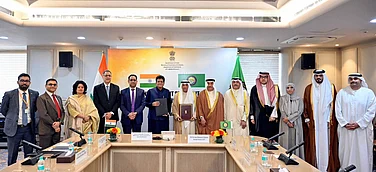The Supreme Court on Monday is scheduled to pronounce judgement on petitions challenging the Narendra Modi-led Union government's demonetisation in 2016.
On November 8, 2016, Prime Minister Narendra Modi announced that currency notes of 500 and 1,000 denominations would cease to be legal tender and would instead be replaced with newer nots of denominations of 500 and 2,000. The surprise decision led to huge shortage of cash and long lines at ATMs and banks to exchange the notes and attracted widespread critcism.
As many as 58 petitions have been filed against the demonetisation decision and a five-judge bench of the Supreme Court is set to give a verdict today. The bench will be headed by Justice SA Nazeer and will also comprise Justices BR Gavai, BV Nagarathna, AS Bopanna and V Ramasubramanian.
There will be two separate judgements which will be pronounced by Gavai and Nagarathna, according to Monday's cause list of the top court. It is not clear whether the two judgements will be concurring or dissenting.
Earlier on December 7, the Supreme Court had directed the Centre and the Reserve Bank of India (RBI) to put on record the relevant records relating to the government's 2016 decision and reserved its verdict. It heard the arguments of Attorney General R Venkataramani, the RBI's counsel, and the petitioners' lawyers, including Senior Advocates P Chidambaram and Shyam Divan.
Calling the scrapping of the Rs 500 and Rs 1,000 currency notes deeply flawed, Chidambaram had argued that the government cannot on its own initiate any proposal relating to legal tender, which can only be done on the recommendation of the RBI's central board.
Resisting SC's attempt to revisit the 2016 demonetisation exercise, the Union government had said the court cannot decide a matter when no tangible relief can be granted by way of "putting the clock back" and "unscrambling a scrambled egg".
The RBI had earlier admitted in its submissions that there were "temporary hardships" and that those too are an integral part of the nation-building process, but there was a mechanism by which the problems that arose were solved.
In an affidavit, the Centre told the top court recently that the demonetisation exercise was a "well-considered" decision and part of a larger strategy to combat the menace of fake money, terror financing, black money and tax evasion.
The Supreme Court has heard a batch of 58 petitions challenging the demonetisation exercise announced by the Centre on November 8, 2016.
(With PTI inputs)






















